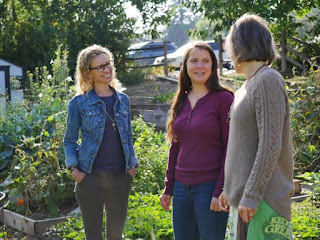 |
| Professor Jill Litt (right) checks on a plant with colleague Erin Decker (left) at a community garden next to Regis University. Photos by Glenn Asakawa/CU Boulder, 2017 |
We’ve all heard the anecdotal evidence of gardening improving people’s health but up until now, few studies have scientifically tested gardening’s effects on disease risk factors. Our own University of Colorado did that and the findings were published Jan. 4 in the journal Lancet Planetary Health and Science Direct.
Though research on gardening abounds, the researchers wrote
that they were able to find only three other studies that tested gardening’s
effects on disease risk factors by assigning participants randomly to groups
who did and didn’t garden, then comparing their health. “These findings provide
concrete evidence that community gardening could play an important role in
preventing cancer, chronic diseases and mental health disorders,” said senior
author Jill Litt, a professor in the Department of Environmental Studies at CU
Boulder.
The research was funded by the American Cancer Society, and
is the first-ever, randomized, controlled trial of community gardening. It
found that those who started gardening ate more fiber and got more physical
activity—two known ways to reduce risk of cancer and chronic diseases. They
also saw their levels of stress and anxiety significantly decrease. In this
case, the CU researchers ran a study at 37 community gardens in Denver and
Aurora, CO. After raising awareness of the program in a variety of neighborhoods,
they recruited those on the waiting lists for the study. They recruited 291
non-gardening adults, average age of 41, from the Denver area. More than a
third were Hispanic and more than half came from low-income households.
After the last spring frost, half were assigned to the
community gardening group and half to a control group that was asked to wait
one year to start gardening. The gardening group received a free community
garden plot, some seeds and seedlings, and an introductory gardening course through
the nonprofit Denver Urban Gardens program and a study partner.
Both groups took periodic surveys about their nutritional
intake and mental health, underwent body measurements and wore activity
monitors.
During the study, researchers found, those who gardened ate
more fruit and vegetables than their counterparts, increasing their consumption
by about 1.13 servings per day. They consumed 1.4 grams more fiber a day than
the control group, and increased their fiber intake by 7 percent over the
course of the program. They were slightly more active, too, increasing their
moderate to vigorous physical activity during the study period. Gardeners also
reported less stress and anxiety than their non-gardening counterparts.
Though the gains were modest, researchers said that they are
the types of small changes recommended by experts as a way to prevent the risk
of chronic diseases. Smoking, poor diet and a sedentary lifestyle all
contribute to that risk.
The study results don’t surprise Linda Appel Lipsius,
executive director of Denver Urban Gardens (DUG), a 43-year-old nonprofit that
helps about 18,000 people each year grow their own food in community garden
plots.
“It’s transformational, even life-saving, for so many
people,” Lipsius said.
 |
Professor Jill Litt (left) talks with colleagues Eva Coringrato (middle) and Erin Decker (right) in a Denver area community garden. Photo by Glenn Asakawa/CU Boulder, 2017. |
Many DUG participants live in areas where access to
affordable fresh fruits and vegetables is otherwise extremely limited. Some are
low-income immigrants now living in apartments—having a garden plot allows them
to grow food from their home country and pass on traditional recipes to their
family and neighbors.
The social connection is also huge.
“Even if you come to the garden looking to grow your food on
your own in a quiet place, you start to look at your neighbor’s plot and share
techniques and recipes, and over time relationships bloom,” said Litt, noting
that while gardening alone is good for you, gardening in community may have
additional benefits. “It’s not just about the fruits and vegetables. It’s also
about being in a natural space outdoors together with others.”
Litt said she hopes the findings will encourage health
professionals, policymakers and land planners to look to community gardens, and
other spaces that encourage people to come together in nature, as a vital part
of the public health system. The evidence is clear, she said: gardening works.
Researchers from the Colorado School of Public Health,
University of Colorado Cancer Center, Colorado State University and Michigan
State University also contributed to this study.
Sources:
https://www.washingtonpost.com/health/2023/01/23/gardening-health-disease-reduction/
https://www.colorado.edu/today/2023/01/05/scientific-reasons-you-should-resolve-start-gardening-2023
https://www.sciencedirect.com/science/article/pii/S2542519622003035



